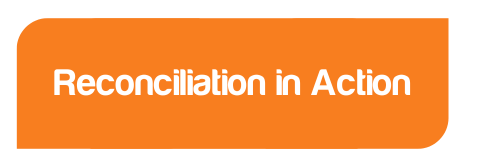
Aboriginal Friendship Centres of Saskatchewan (AFCS), alongside our 10-member Friendship Centres, actively support 52 of the 94 Calls to Action through our current work.
AFCS continuously works towards recognizing the valuable contributions of Indigenous peoples throughout history, including the resilience of the survivors of Canada’s residential school system, and the importance of upholding the Truth and Reconciliation Commission’s Calls to Action.
Throughout September we will be sharing information on our social media accounts of the Calls to Action that the Saskatchewan Friendship Centre Movement addresses through their work.
AFCS and our 10-member Friendship Centres currently act on these Truth and Reconciliation Calls to Action:
2, 7, 8, 9, 10, 11, 12, 14, 15, 17, 19, 21, 22, 23, 27, 28, 30, 31, 35, 39, 40, 43, 44, 45, 51, 53, 54, 55, 56, 57, 61, 63, 64, 65, 66, 67, 69, 71, 72, 73, 74, 78, 79, 82, 83, 86, 87, 88, 89, 90, 92, 93.
https://tinyurl.com/TRC-Calls-to-Action
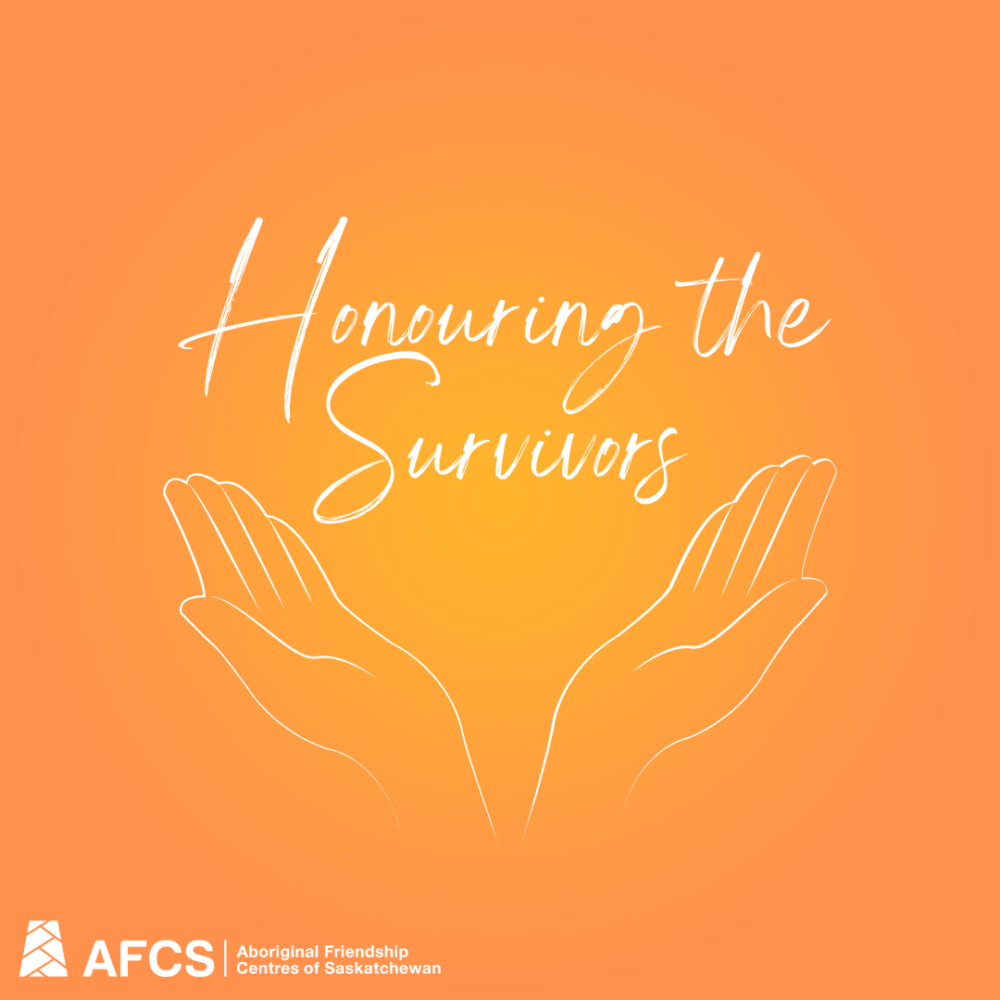
National Centre for Truth and Reconciliation
Each year the National Centre for Truth and Reconciliation recognizes the last full week of September as “Truth and Reconciliation Week”, this year that falls on the date of September 25th – 30th, 2023.
During the month of September, we take time to remember all the children who were never able to come back to their families due to the Canadian residential school system and we honour those who survived.
The theme for this year’s Truth and Reconciliation week is “Honouring the Survivors”.
Truth and Reconciliation Week 2023 – NCTR
The Survivors Flag
On June 21st, 2023, the Survivors Flag was changed and re-raised on Parliament Hill in Ottawa.
The flag was initially raised on September 30th of 2021, on the inaugural National Day for Truth and Reconciliation. The Survivors Flag serves as a symbol of remembrance, intended to pay tribute to those who survived Canada’s residential school system as well as the countless lives and communities that were profoundly affected.
The flag’s design was thoughtfully chosen by Survivors from across Canada. There was extensive consultation done throughout the flag’s creation process. Every element on the flag bears a significant meaning, making it a powerful representation of the lasting impact of residential schools.
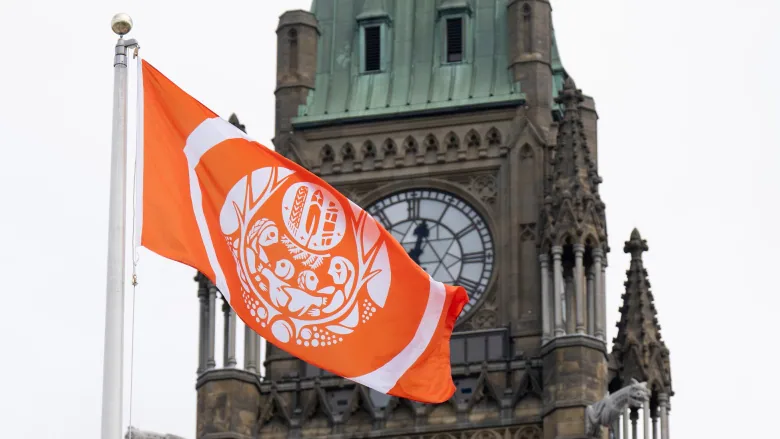
Learn More: The Survivors’ Flag – NCTR
Photo from: Flag raised on Parliament Hill to honour residential school survivors | CBC News
Honouring the Survivors and the Lives Lost in Saskatchewan
On June 21st, 2022 the Saskatchewan Residential School Memorial was unveiled at the Government House grounds in Regina, SK.
Much like the Survivors Flag in Ottawa, Ontario, the process of consultation with Elders, Residential School Survivors, and Knowledge Keepers took several years. The monument holds both spiritual and physical aspects for recognition, remembrance and education regarding the continued impacts of the residential school system on Indigenous people here in Saskatchewan.
Visitors to the monument will find a large rock in the center of a circle that beholds the plaque which names all the residential schools that operated in Saskatchewan. At the foot of the monument there is a smudge stone and along the perimeter in the four primary directions are four benches surrounded by plants and trees that are native to Saskatchewan.
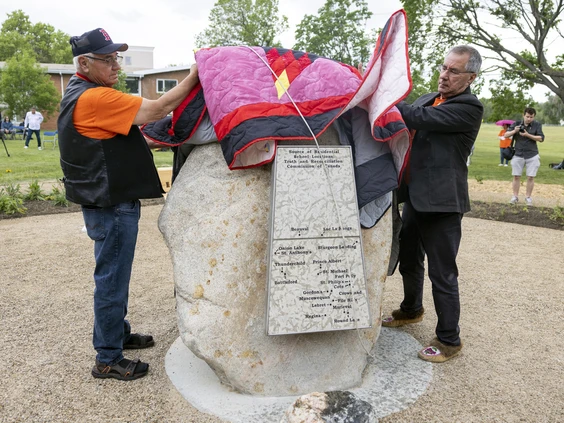
Learn more: Dedication of Residential School Memorial at Government House | News and Media | Government of Saskatchewan
Visit the monument: 50°27’14.4″N 104°38’56.8″W – Google Maps
Photo from: ‘A lasting place … to remember:’ Sask. Residential School Memorial | Regina Leader Post
Truth and Reconciliation Week – Education Package
The National Centre for Truth and Reconciliation also offers a free educational package which is open to all schools across Canada for grades 1-12.
Days 1-3 & 5: Educational Programming
The week-long program will feature programming includes both live and pre-recorded materials provided through a virtual platform. Students will have the opportunity to learn directly from residential school Survivors, Indigenous artists and athletes, and other subject matter experts. Learning topics will include the gifts Indigenous peoples bring to the world, the history of Residential Schools, and what learners and educators can do to take action toward reconciliation.
Day 4: Gidinawendimin – We Are All Related
As part of our week-long program, the NCTR will host a live youth empowerment event: “Gidinawendimin – We Are All Related” on September 28th in the Ottawa/Gatineau area.
For more information or to sign up for the education package, see here: Truth and Reconciliation Week 2023 – NCTR
Calls to Action #43 & #44

43. We call upon federal, provincial, territorial, and municipal governments to fully adopt and implement the United Nations Declaration on the Rights of Indigenous Peoples as the framework for reconciliation.
44. We call upon the Government of Canada to develop a national action plan, strategies, and other concrete measures to achieve the goals of the United Nations Declaration on the Rights of Indigenous Peoples.
Calls_to_Action_English2.pdf (exactdn.com)
The work done at AFCS, and the 10-member Friendship Centres across Saskatchewan not only focus on addressing the Truth and Reconciliation Calls to Action but works towards upholding the standards of inherent rights and sovereignty for Indigenous peoples laid out by the United National Declaration on the Right of Indigenous Peoples.
Currently, the work being done by AFCS and the 10-Member Friendship Centres addresses 10 of the 46 Articles of UNDRIP. Those Articles are: 2, 3, 8, 9, 11, 12, 13, 25, and 31.
Call to Action #66

66. We call upon the federal government to establish multi-year funding for community-based youth organizations to deliver programs on reconciliation, and establish a national network to share information and best practices.
Calls_to_Action_English2.pdf (exactdn.com)
During the 2022-2023 fiscal year, AFCS and the 10-member Friendship Centres had youth programming supported through the Supports for Student Learning Program (SSLP) funding through the Federal Government. This funding agreement was only for a one-year period.
During this time, AFCS and the Friendship Centres provided 24,000+ points of service!
The SSLP funding supported the Friendship Centre Movement in Saskatchewan by re-establishing youth programming to the communities as well as providing provincial-wide programming through AFCS’s Youth Leadership Program.
Through the funding, Friendship Centres and AFCS have provided opportunities focusing on areas such as: educational supports, mental health and wellness, traditional learning, extracurricular activities and events.
It has become clear that youth in our communities wanted and needed the programming Friendship Centres provided due to this funding.
If the Saskatchewan Friendship Centre Movement was able to provide over 24,000 points of service to youth in the span of one year, think about how much impact a multi-year funding agreement would have on youth’s lives.
We urge the government to create a long-term funding plan for youth organizations in the community that focuses on providing reconciliation programs.
Call to Action #90

90. We call upon the federal government to ensure that national sports policies, programs, and initiatives are inclusive of Aboriginal peoples, including, but not limited to, establishing:
i. In collaboration with provincial and territorial governments, stable funding for, and access to, community sports programs that reflect the diverse cultures and traditional sporting activities of Aboriginal peoples.
ii. An elite athlete development program for Aboriginal athletes.
iii. Programs for coaches, trainers, and spots officials that are culturally relevant for Aboriginal peoples.
iv. Anti-racism awareness and training programs.
Calls_to_Action_English2.pdf (exactdn.com)
The Living Skies Indigenous Basketball League (LSIBL) strives to provide a space for athletes to develop and showcase their skills on the basketball court through a holistic approach to sport, working on the physical, mental, spiritual, and cultural aspect of every athlete.
During the season, the LSIBL offers workshops for athletes that addresses social and cultural topics like resiliency, mental health and suicide prevention, nutrition, resume writing and various guest speakers.
Although the Indigenous community is the focus for the LSIBL, in the spirit of reconciliation, they welcome all athletes and coaches that have a passion for basketball!
For further information on the league check out their website here: HOME | Living Skies Indigenous Basketball League (livingskiesbasketball.com)
Call to Action #88

88. We call upon all levels of government to take action to ensure long-term Aboriginal athlete development and growth, and continued support for the North American Indigenous Games, including funding to host the games and for provincial and territorial team preparation and travel
Calls_to_Action_English2.pdf (exactdn.com)
Since day #1, the Living Skies Indigenous Basketball League has set out intentions to provide a space where all athletes are obtaining proper and consistent coaching that will help with their development and transition into high performance events such as the North American Indigenous Games.
Over the course of the past two seasons of the LISBL coaches have continued their training to ensure proper development of athletes.
In total, LSIBL coaches have completed 88 additional courses to support the youth involved in the league. These courses are as followed: Learn to Train: Canada Basketball’s Coaching Education, Respect in Sport, Coaching all Abilities and Keeping Girls in Sport.
The Aboriginal Friendship Centres of Saskatchewan and Living Skies Indigenous Basketball League are happy to announce that 17 athletes from the league were able to participate in the North American Indigenous Games (NAIG) on Team Saskatchewan!
u16 Girls: 2 Athletes
u16 Boys: 4 Athletes
u19 Girls: 6 Athletes
u19 Boys: 5 Athletes
What an accomplishment!! We are all so proud of your hard work and determination to get to that level of sport!
For further information on the league check out their website here: HOME | Living Skies Indigenous Basketball League (livingskiesbasketball.com)
Calls to Action #57 & #18
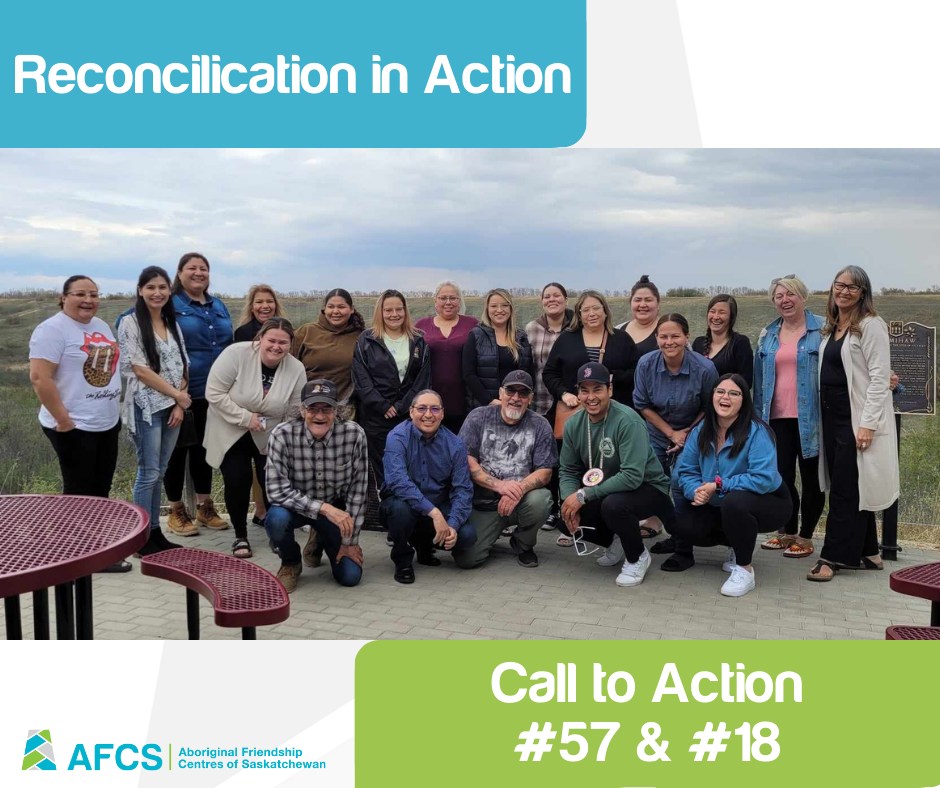
57. We call upon federal, provincial, territorial, and municipal governments to provide education to public servants on the history of Aboriginal peoples, including the history and legacy of residential schools, the United Nations Declaration on the Rights of Indigenous Peoples, Treaties and Aboriginal rights, Indigenous law, and Aboriginal–Crown relations. This will require skills-based training in intercultural competency, conflict resolution, human rights, and anti-racism.
18. We call upon the federal, provincial, territorial, and Aboriginal governments to acknowledge that the current state of Aboriginal health in Canada is a direct result of previous Canadian government policies, including residential schools, and to recognize and implement the health-care rights of Aboriginal people as identified in international law, constitutional law, and under the Treaties.
Calls_to_Action_English2.pdf (exactdn.com)
Since April 2022, AFCS and participating Saskatchewan Friendship Centres have been on a mission to develop our very own Cultural Humility Training that is relevant to First Nations, Metis and Inuit culture and history here in Saskatchewan.
Currently, the Cultural Humility Training is being piloted with the Saskatchewan Health Authority (SHA). AFCS has a goal of providing training to 1,800 SHA staff over the year. This is all being done by the support of funding through the Addressing Racism and Discrimination in Canada’s Health Systems Program by Health Canada.
Once our pilot project is complete, AFCS and the participating Saskatchewan Friendship Centres will be offering this training to the public. Through this training, attendees can gain valuable insights into how culture shapes our behaviour in response to our surroundings.
Let us remember that each of us belong to many cultures, and culture is ever-changing and evolving. It is crucial that we not only familiarize ourselves with the cultural differences that exist between various groups as well as examine our own culture and how it affects our day-to-day lives.
Calls to Action #22 & #23
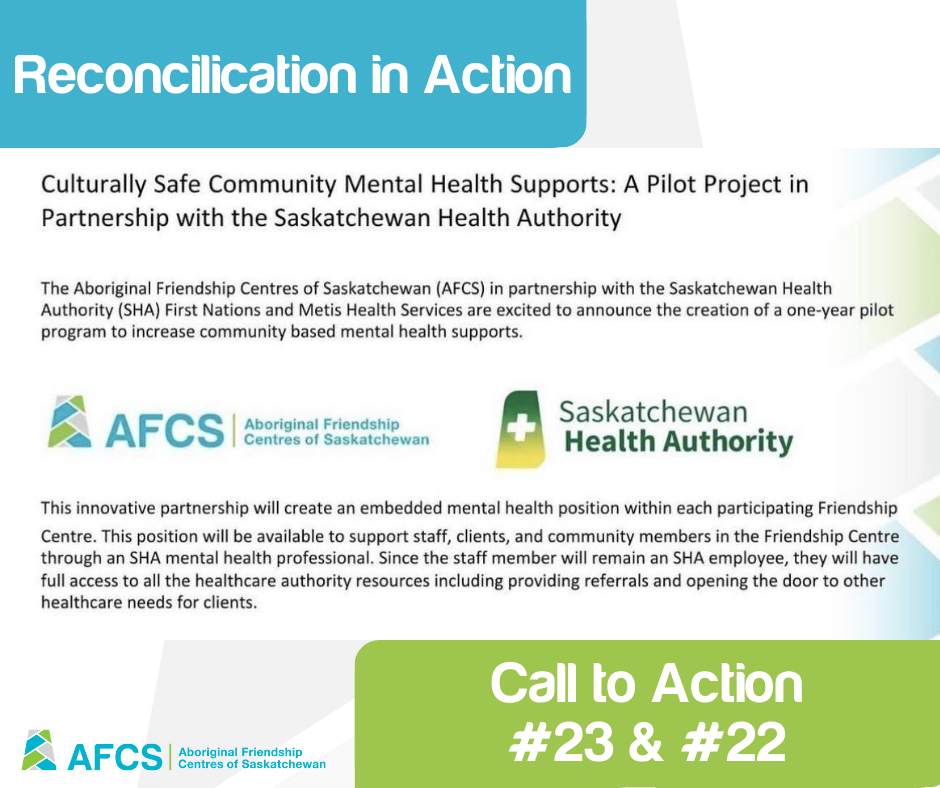
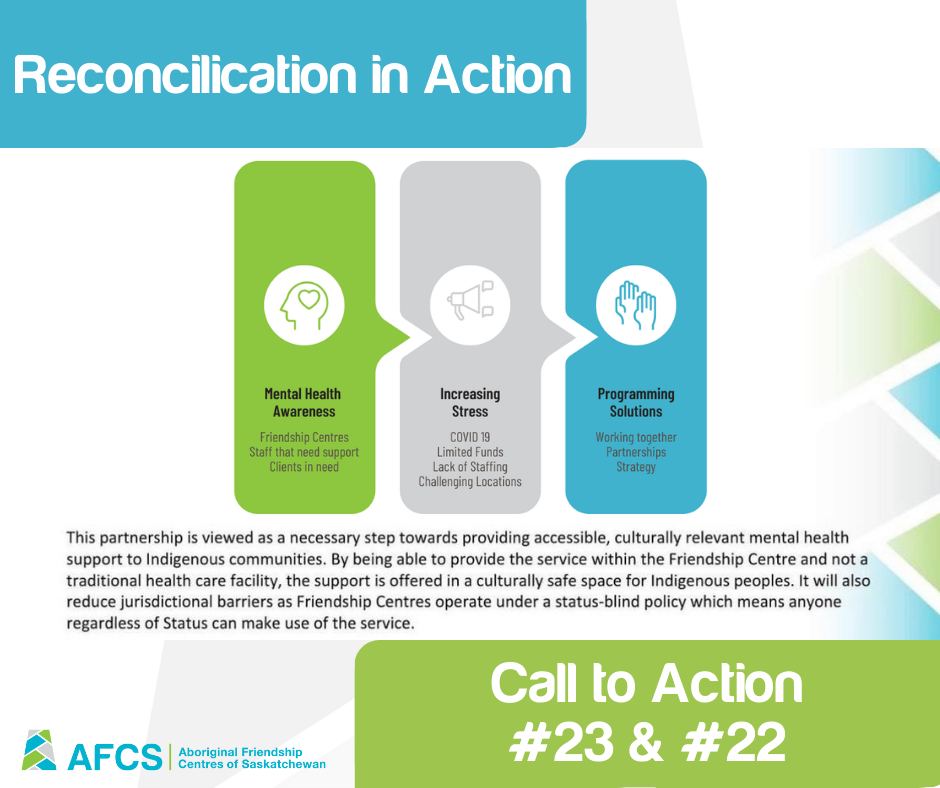
23. We call upon all levels of government to:
i. Increase the number of Aboriginal professionals working in the health-care field.
ii. Ensure the retention of Aboriginal health-care providers in Aboriginal communities.
iii. Provide cultural competency training for all health-care professionals.
22. We call upon those who can effect change within the Canadian health-care system to recognize the value of Aboriginal healing practices and use them in the treatment of Aboriginal patients in collaboration with Aboriginal healers and Elders where requested by Aboriginal patients.
Calls_to_Action_English2.pdf (exactdn.com)
On May 9th, 2023, AFCS announced our Culturally Safe Community Mental Health Supports – Pilot Project in partnership with the Saskatchewan Health Authority (SHA) Frist Nations and Metis Health Services.
Across Saskatchewan, mental health has been frequently identified as a recurring need in all the communities that a Friendship Centre resides in. Over the past 3 years, the need for culturally appropriate mental health support has significantly increased. Addressing these concerns is a top priority for AFCS and the Saskatchewan Friendship Centres.
Through this pilot project, a SHA Health Educator staff will be placed in each of the participating Friendship Centres. By being able to have a SHA employee at the Friendship Centres, members of the community will be able to access culturally relevant health care and mental health support.
Call to Action #12
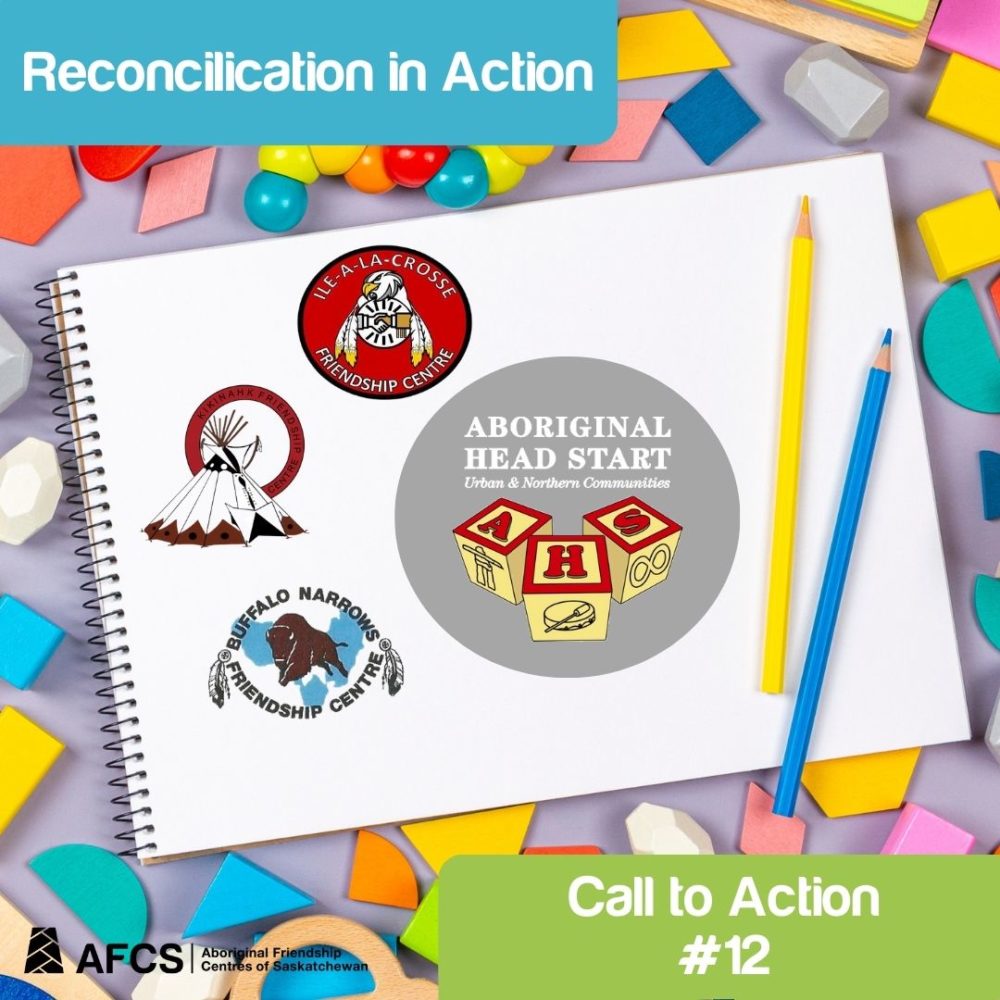
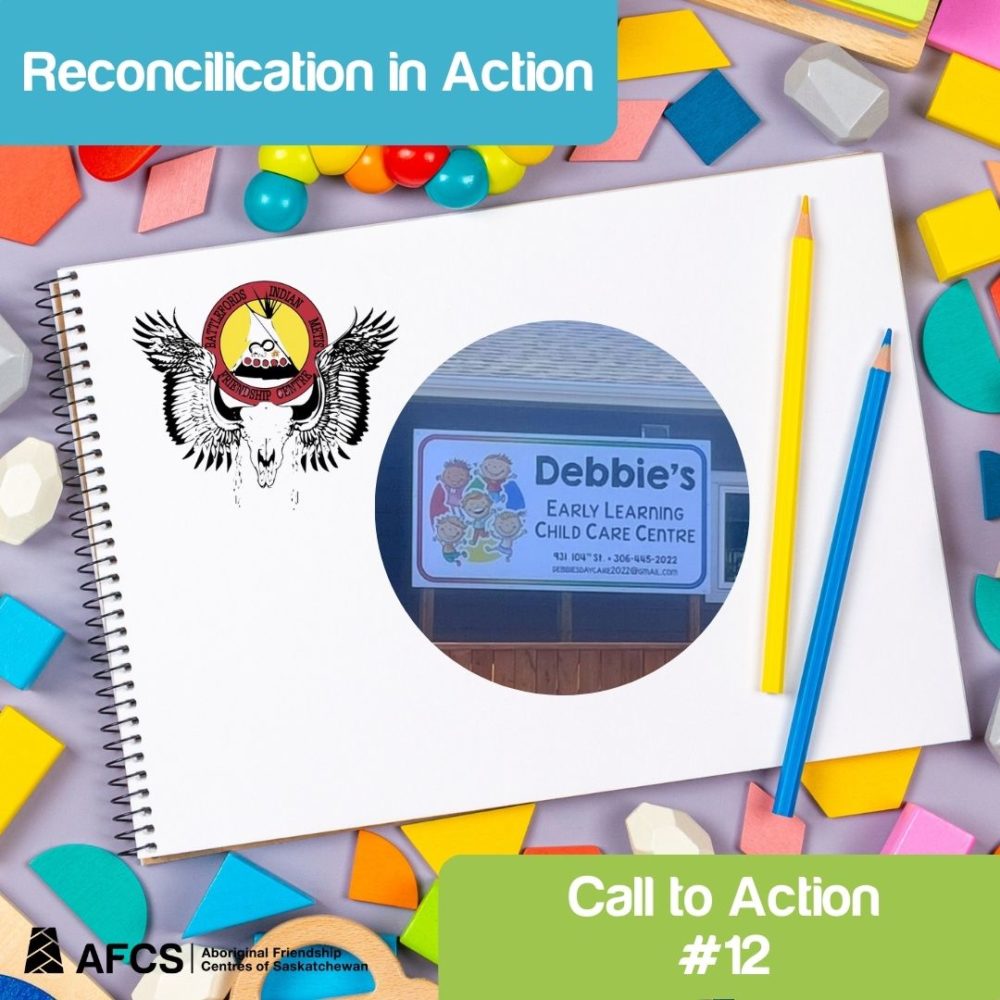
12. We call upon the federal, provincial, territorial, and Aboriginal governments to develop culturally appropriate early childhood education programs for Aboriginal families.
Calls_to_Action_English2.pdf (exactdn.com)
In Saskatchewan, four Friendship Centres communities offer Early Childhood Education programs.
Île-à-la-Crosse, Buffalo Narrows and Kikinahk (La Ronge) have the Aboriginal Head Start (AHS) program for First Nations, Métis and Inuit children up to 6 years of age. It aims to create a safe and holistic environment where children can learn and build a strong foundation for their future.
The main program components of the AHS program are:
1. Culture and Language
2. Education
3. Health Promotion
4. Nutrition
5. Social Suppor
t6. Parental and Family Involvement
The Battleford Indian and Metis Friendship Centre has its own Debbie’s Early Learning Childcare Centre with 46 spots and six full-time staff. Debbie’s emphasizes the importance of learning about Indigenous culture and is a multi-cultural space for children to learn about all cultures within their community.
For more information on the Aboriginal Head Start program, check out these links:
Aboriginal Head Start in Urban and Northern Communities (AHSUNC) – Canada.ca
Aboriginal Head Start Urban and Northern Initiative – Canada.ca
Contact the Aboriginal Head Start in Urban and Northern Communities Program – Canada.ca
Call to Action #14
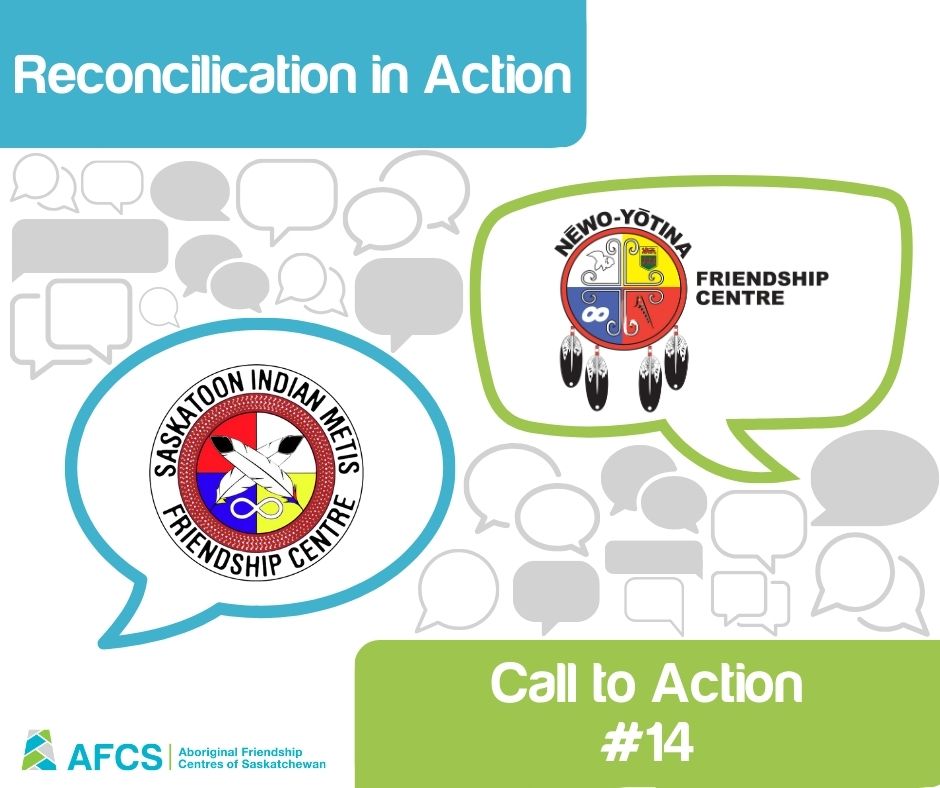
14. We call upon the federal government to enact an Aboriginal Languages Act that incorporates the following principles:
i. Aboriginal languages are a fundamental and valued element of Canadian Culture and society, and there is an urgency to preserve them.
ii. Aboriginal language rights are reinforced by the Treaties.
iii. The federal government has a responsibility to provide sufficient funds for Aboriginal-language revitalization and preservation.
iv. The preservation, revitalization and strengthening of Aboriginal languages and cultural are nest manager by Aboriginal people and communities.
v. Funding for Aboriginal language initiatives must reflect the diversity of Aboriginal language.
Calls_to_Action_English2.pdf (exactdn.com)
The Newo-Yotina Friendship Centre and Saskatoon Indian and Metis Friendship Centre both take active steps in preserving Indigenous languages in their communities.
Throughout the year, the Newo-Yotina Friendship Centre (NYFC), offers language classes in Cree, Saulteaux, Dene, Lakota and Michif. These classes are offered online by Zoom to make attending easy to do from the comfort of your home! The success of their language programming is shown in the interest of attendees spanning across Canada and from the states!
NYFC also has Language Culture Camps for ages 8-14, that happen during breaks from school. The campers have a choice of learning either Cree or Saulteaux. Each day is full of activities such as: powwow lessons, tipi teachings, medicine wheel teachings, smudge kit making and of course language classes!
The Saskatoon Indian and Metis Friendship Centre in the past year has offered 12-week long language classes in Cree, Dene, Michif and Dakota which are open to all ages.
The Indigenous language program provides four courses aimed at helping individuals uncover their cultural identity by learning their language and finding their voice. These courses offer a unique opportunity for individuals to continue their journey of cultural discovery and ensure that the traditions and heritage of Indigenous communities are preserved for future generations.
For further information on these Friendship Centres, check out their websites here:
SASKATOON INDIAN & MÉTIS FRIENDSHIP CENTRE (simfc.ca)
Aboriginal Friendship Centres of Saskatchewan – Orange Shirt Day
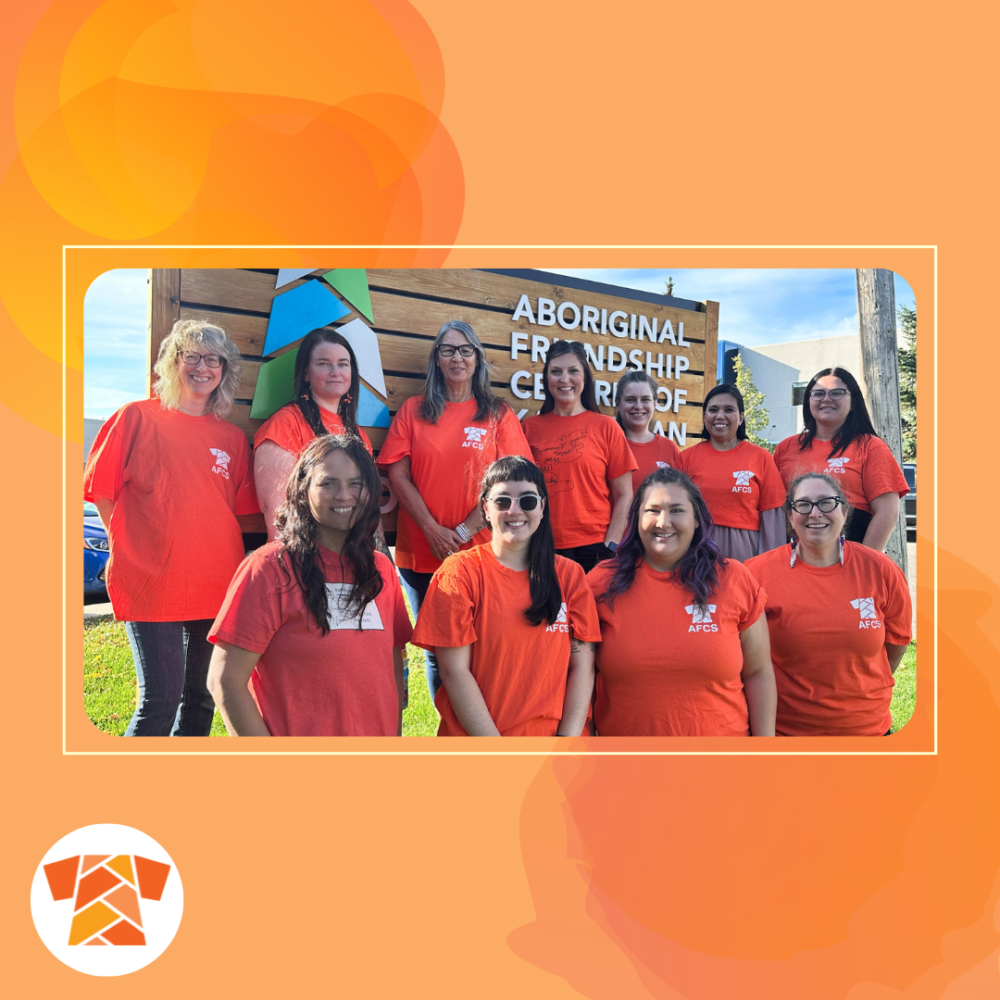
Join AFCS in wearing orange every last Friday of each month to signify our ongoing commitment to reconciliation and honour the Survivors of residential schools.
Here are some ways you can honour the National Day of Truth and Reconciliation:
1. Support an Indigenous-led organization in your area, like a Friendship Centre, and join in on their events.
2. Wear orange and support local by purchasing your orange t-shirts from Indigenous-owned shops or organizations.
3. Seek out learning opportunities on the topic of reconciliation.
4. Read the 94 Calls to Action.
5. Acknowledge the land you live on – Indigenous history is Canadian history. It’s important to understand and acknowledge the land you live on through appropriate research and education. Together, we can work towards a better future for all.
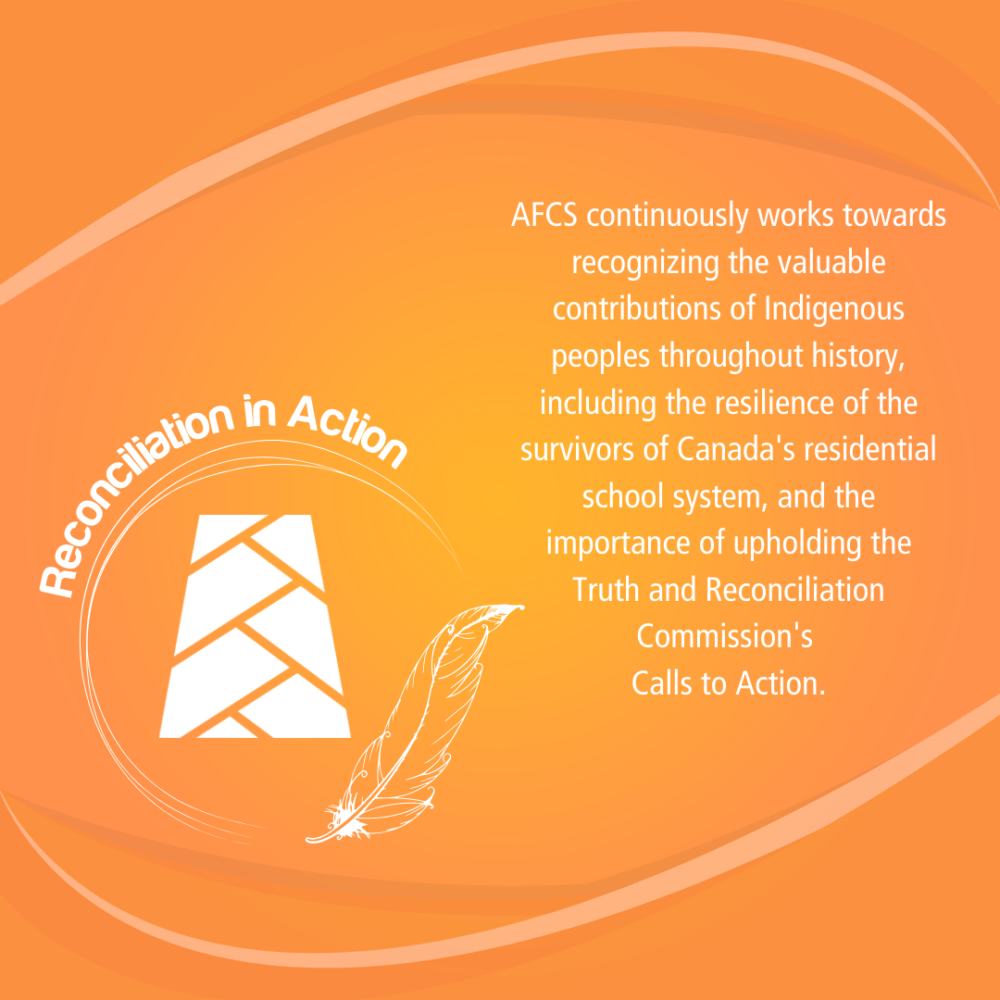
- Battleford Indian & Metis Friendship Centre
- Buffalo Narrows Friendship Centre
- Ile a la Crosse Friendship Centre
- Kikinahk Friendship Centre
- La Loche Friendship Centre
- Newo-Yotina Friendship Centre
- North West Friendship Centre
- Prince Albert Indian & Metis Friendship Centre
- Qu’Appelle Valley Friendship Centre
- Saskatoon Indian & Metis Friendship Centre